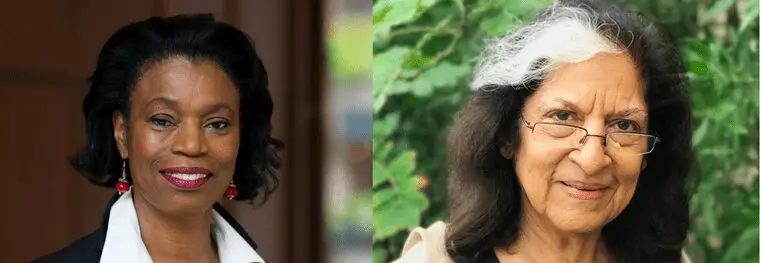Hastings Center News
Hastings Center Recognizes Anita L. Allen and Farhat Moazam with 2022 Bioethics Founders’ Award
Anita L. Allen, JD, PhD, the Henry R. Silverman Professor of Law and professor of philosophy at the University of Pennsylvania Carey School of Law, and Farhat Moazam, MD, PhD, professor and founding chairperson of the Centre of Biomedical Ethics and Culture (CBEC) of the Sindh Institute of Urology and Transplantation in Pakistan, have been named the recipients of the 2022 Bioethics Founders’ Award.
The award, given by The Hastings Center, recognizes individuals from around the world who have made substantial, sustained contributions to bioethics in ways that have advanced thinking and practice in medicine, the life sciences, and public policy.
Anita L. Allen
Dr. Allen (above, left) was recognized for outstanding contributions to law and philosophy and to their practical applications in medicine, science, and public affairs.
A graduate of Harvard Law School with a PhD in philosophy from the University of Michigan, she is internationally renowned as an expert on philosophical dimensions of privacy and data protection law, ethics, bioethics, legal philosophy, women’s rights, and diversity in higher education. She has been named among the world’s top 20 philosophers by Academic Influence. Allen was president of the Eastern Division of the American Philosophical Association from 2018 to 2019, the first African American woman in history to be so named.
Dr. Allen is an elected member of the American Law Institute, the American Philosophical Society, and the National Academy of Medicine and is a former member of the National Academies’ Forum on Cyber Resilience. She is a fellow of the American Academy of Arts and Sciences and of The Hastings Center. She served under President Barack Obama as a member of the Presidential Commission for the Study of Bioethical Issues. For two years she was on the institutional review board of the National Institutes of Health’s Precision Medicine Initiative and the National Advisory Council on Human Genome Research. She was chair of the board of the Electronic Privacy Information Center (EPIC) in Washington, D.C., from 2020 to 2022; in 2014 she received a lifetime achievement award from EPIC for her pioneering privacy scholarship and advocacy, and for the same accomplishment she was awarded honorary doctorates from Tilburg University in the Netherlands and the College of Wooster in the United States. She has been recognized by the Alaine Locke Society and the Collegium of Black Women Philosophers.
Dr. Allen is co-author of Privacy Law and Society (2016), a comprehensive textbook in the field. Her other books about data protection, values, and contemporary life include Unpopular Privacy: What Must We Hide (2011); The New Ethics: A Guided Tour of the 21st Century Moral Landscape (2004), Why Privacy Isn’t Everything (2003), and Uneasy Access: Privacy for Women in a Free Society.
Farhat Moazam
Dr. Moazam was commended for a remarkable range of accomplishments as a pediatric surgeon and an educator, ethicist, ethnographic researcher, and institution-builder.
She is an American board-certified pediatric surgeon with a master’s degree in bioethics and a doctorate in religious studies from the University of Virginia. Her areas of interest in bioethics include research and education with a focus on cross-cultural ethics in clinical medicine. CBEC, which she founded in 2004, was designated a WHO Collaborative Centre for Bioethics for the Eastern Mediterranean Region in 2017. From 1985 to 1995, Dr. Moazam was a professor and the founding chairperson of the department of surgery and, from 1995 to 2000, she was the first associate dean of postgraduate medical education at the Aga Khan University in Karachi.
Dr. Moazam is a fellow of the Institute of Practical Ethics and The Hastings Center. She received an honorary doctorate from the University of Zurich in 2012 for fundamental contributions towards ethics and organ transplantation in Pakistan. She received lifetime achievement awards– in 2014 from the Fifth National Bioethics Conference in Bangalore, India, for the promotion of bioethics education and efforts to support ethical organ transplantation programs, and in 2020 from the department of surgery at Aga Khan University. She served on the board of directors of the International Association of Bioethics from 2009 to 2014, and has collaborated with the WHO on various projects, including international guidelines for ethical transplantation of human organs and tissues and as member of the WHO Ebola Ethics Working Group, which formulated ethical guidelines for health professionals managing global epidemics. She is a member of the National Bioethics Committee in Pakistan and chairs its section dealing with health care ethics.
Her doctoral dissertation, Bioethics and Organ Transplantation in a Muslim Society: A Study in Culture, Ethnography and Religion, published in 2006, is an ethnographic study of kidney donation in Pakistan and the cultural, ethical, and family conflicts that accompany them. It added depth and detail to international debates about organ sales.
——-
Recipients of the Bioethics Founders’ Award are selected by a standing committee of Hastings Center fellows (with preference given to previous recipients of the award) appointed by the president of The Hastings Center. The current committee consists of Alexander M. Capron (chair), University of Southern California; Ruth Macklin (vice chair), Albert Einstein College of Medicine; Solomon R. Benatar, University of Cape Town; Sissela Bok, Harvard University; and James F. Childress, University of Virginia.

